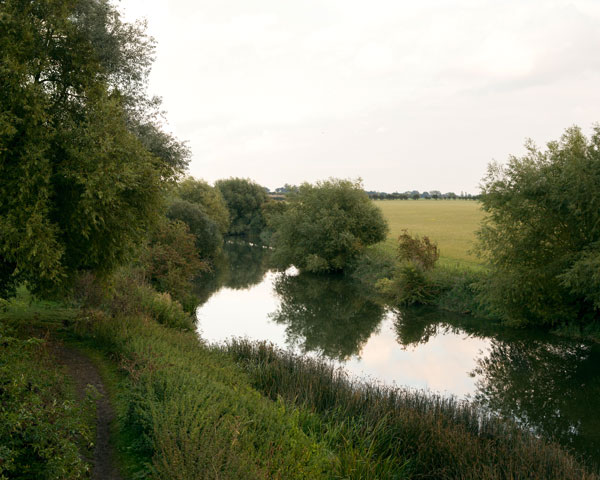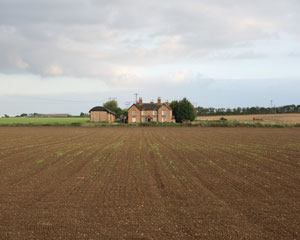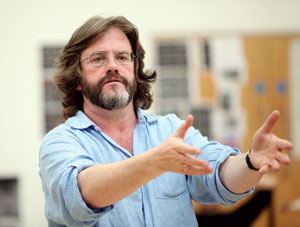A walk with the FT: The Stratford-upon-Avon route

Simply sign up to the Life & Arts myFT Digest -- delivered directly to your inbox.
As I turn into the churchyard of Holy Trinity in Stratford-upon-Avon, a figure strides to meet me down the path. Greg Doran, the artistic director of the Royal Shakespeare Company, is dressed more for the rehearsal room than an early morning country walk, with his spotless cream trousers and jumper. But at least he is wearing sturdy boots.
After a few hot days, it’s disappointingly overcast. “My mother would call this ‘soft’ weather,” comments Doran. The church is not open yet, so we can’t visit Shakespeare’s tomb (“Cursed be he that moves my bones”). But there is something he wants to show me before we set off. By the church gate is a slender cross, half concealed by ivy. Doran pulls away the greenery. It’s a memorial to one Kathleen Stoehr, who died when the SS Persia was sunk by a U-boat on the way to India in 1915. “It was the first civilian atrocity of World War One,” Doran explains.
We walk past the church, where Doran points out the windows above the porch. The room was once the “bawdy court” where, as the name suggests, those accused of unruly behaviour were summoned. Shakespeare’s own son-in-law was accused of fornication and convicted, just before the playwright’s death at 52. The shame is said to have hastened his demise.
We exit and turn left, following the line of the church wall down a winding lane, and coming to a row of modern, comfortable-looking houses belonging to the RSC, where Doran lives during the season along with the actors. Beyond is a narrow alleyway that leads to the River Avon. With the river on our left, the town at our backs, very quickly we are in open countryside and quiet water-meadows. The riverbank is decked with wildflowers; Doran points out a tall plant with vivid purple blooms and quotes Gertrude’s lines from Hamlet as she describes the death of Ophelia: “Therewith fantastic garlands did she make/Of crowflowers, nettles, daisies and long purples/That liberal shepherds give a grosser name …” It could be this very plant, says Doran; it’s a kind of orchid vulgarly known as “dog’s testicles”.
A little further on, he hands me a round, green burr from a burdock plant, which sticks to my fingers – “it’s where the idea of Velcro came from.” And there’s another Shakespearean significance: Lear in his madness is crowned with burdock, nettles and other weeds. “You realise it’s such a bizarre image,” says Doran, leading me on to a larger, pricklier specimen with ragged yellow leaves the size of washcloths. It’s tempting to think that you can get closer to Shakespeare the man in this place he must have known well, but it’s a fantasy, really. “We know what Ben Jonson was like because his plays are full of his personality. Shakespeare’s aren’t,” Doran remarks. “He was the man in the corner, quietly observing everything.” There’s a legend that Shakespeare was out drinking in a nearby village one night and lurched back drunkenly through these fields, to stumble in the river, catch cold and shortly die. Doran finds it plausible.

“I can’t tell you how beautiful this walk is when the sun is out,” he sighs. But the mist softening the edges of the fields has its own quiet appeal. This is a walk he and his partner, the actor Antony Sher, do regularly.
We come to the old railway bridge over the river and cross it, following the former railway line, now a pleasant footpath. We pass the horseracing track where Doran remembers camping as a teenager with a friend, in order to go to the theatre. “Only we forgot the tent-poles.” The Shakespeare bug bit early. His father had a classical record of music from A Midsummer Night’s Dream, interspersed with speeches from the play. Puck’s line, “I’ll put a girdle round about the earth/in 40 minutes,” particularly struck the young Doran: “Once I’d got over the word ‘girdle’, which was something my mum wore, the nerd in me was fascinated. Puck was twice as fast as Sputnik! I just became very curious.”
As we leave the railway path and turn back through the fields, passing farm buildings, we talk about his new season, his first complete one as artistic director; it’s crowned with David Tennant’s Richard II. “The idea of putting the history plays together as a cycle started here in Stratford in 1901,” says Doran. “I wanted to do something different; I thought it would be interesting to see the play as a standalone – as a lyric tragedy in its own right – not merely a prequel to Henry IV.”
It’s one of Shakespeare’s great lyric parts, but tricky: “Richard spends two-thirds of the play moaning about his situation.” Tennant played Hamlet in a previous RSC production, but slipped a disc at the first preview in London. “People were disappointed, but his understudy was terrific. Not one person asked for their money back,” says Doran. “I think David considers he has unfinished business with the RSC.”

I bring up the trend for all-male Shakespeare productions and Doran groans. “Aren’t we over that yet? When there are so few good roles for women in Shakespeare, why take them away?” Doran has come up with a “Roaring Girls” season of plays from Shakespeare’s era with strong female characters, including the murder thriller Arden of Faversham and Webster’s The White Devil.
The route joins the busy B4632 for a short distance; there’s no footpath. “I’m going to insist you walk on the inside,” Doran says, smoothly moving to shield me from traffic. He discusses the Catholic upbringing he rejected as a young man, not least because of the view on homosexuality. “Sartre said the loss of religion leaves a god-shaped hole in your consciousness; well, I’m happy to have filled that with Shakespeare and the theatre.” We come to a gate on the opposite side of the road marked Shakespeare’s Way; joining it, we follow the hedgerow, skirting a field and walking down a deep fold. Doran raises a hand: “Listen: it’s the bells of Holy Trinity, welcoming us back to Stratford.” This is supposed to be the route Shakespeare would have taken when going on foot to London.
The path returns us to the opposite bank of the Avon. Doran’s going home to shower and begin another packed day of meetings and RSC business. I ask him one last question: how do you pronounce his surname? It’s a trochee, not an iamb; the stress is on the first syllable. “People want to pronounce in a fancy way: Dor-AN,” he says. “But I tell them, it’s just plain DOR-an.”
Exit, with a smile.
——————————————-
Greg Doran directs Richard II at the Royal Shakespeare Theatre, Stratford, Oct 10-Nov 16, with a live cinema transmission on Nov 13. It then runs at the Barbican, London, Dec 9-Jan 25; www.rsc.org.uk
Comments